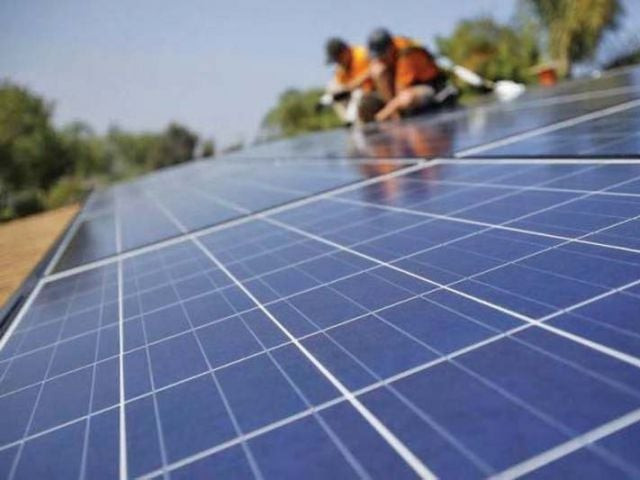Islamabad leads in green energy initiatives
Cheaper, efficient technology coupled with net-metering boost solar power adoption

With clean energy technologies such as solar power become cheaper, more efficient and the government introducing net-metering, citizens of Islamabad and Lahore are taking the lead in installing these systems. The Alternative Energy Development Board (AEDB) was established in 2006, and since then, the policies of subsequent governments have consistently promoted investment in renewable energy or green energy.
Pakistan setting up world's largest solar park
“We are focusing on three types of projects for alternative energy production in the country – solar, wind and biomass – and our progress is very encouraging. We have installed 1,135 megawatts worth of projects including 590MW generated through wind, 400MW from solar, and 145 from biomass projects,” AEDB Chief Executive Officer (CEO) Amjid Ali Awan told The Express Tribune.
He said that by the end of 2018, almost 3,000MW energy will be generated from alternate resources. He said more than 90 per cent of the gains came made after 2012.

He further said that government was taking steps to promote solar energy in the country by exempting import duties on solar products, converting government buildings to solar power, permitting net metering, and introducing feed-in tariffs for independent solar power producers (IPPs) and interest-free loans for farmers to promote solar tube wells.
“There is a large perception among the general public that alternative energy is an expensive solution, whereas flooding of cheaper substandard products in local market besides, instability of the national grid, and uncertified installers are considered major impediments hindering the promotion of green energy in the country,” Pakistan Solar Association (PSA) Vice chairman Nauman Khan Yusufzai told The Express Tribune.
“The energy demand gap of Pakistan can be fulfilled by using only 0.3 per cent of Balochistan,” Yusufzai said, adding that the National Electric Power Regulatory Authority (Nepra) introduced net metering in September 2015, which boosted solar panel installations in the country, particularly in Islamabad and Lahore. He said that from 2015-16, solar panels with total capacity of 970MW were imported, while imports for this year imports are expected to have around 2,000MW capacity. He said that it will promote domestic and small-to-medium industrial level solar installations from 1KW up to 1MW. He said that solar energy production potential in the country is 2.9 gigawatts, as the country is host to some of the world’s highest solar irradiation areas.
Quaid-e-Azam Solar Park to get 900MW upgrade
“Nepra has introduced up front tariffs for solar IPPs, which are US Cents (¢) 11.36 to ¢11.53 for north regions and ¢10.73 to ¢10.89 for south region,” Yusufzai said, adding that these rates were ceilings, with downward adjustments for saving based on power produced in excess of capacity factor 17.5 per cent for north and 15.78 per cent for south, besides construction period interest and plant insurance.
He said that no customs duty or sales tax on import of equipment, with exemption of income tax, withholding tax, and turnover tax, besides repatriation of equity along with dividends are freely allowed, and non-Muslims and foreigners are exempted from payment of zakat on dividends.
“There are 35 wind power projects with a cumulative capacity of 1,747.5MW at different stages of development, of which 12 plants with 590.5MW capacity have started commercial operations and are supplying electricity to the national grid,” said AEDB Policy Director Aqeel Hussain Jafri.
He said that AEDB was going for 28 solar power projects with cumulative capacity of approximately 956.52MW on the grid, while four solar power projects with 400MW capacity are also operational. Jafri said that in order to tap the potential clean electricity generation from sugar mills in Pakistan, the government had announced the framework for biomass power co-generation in February 2013. He said four sugar mills had begun commercial operations, supplying 26.4MW to national grid.
Published in The Express Tribune, December 5th, 2016.



















COMMENTS
Comments are moderated and generally will be posted if they are on-topic and not abusive.
For more information, please see our Comments FAQ